Unpaid care – care of children, the elderly and sick underpins our national economies, greater investment needed
Date:
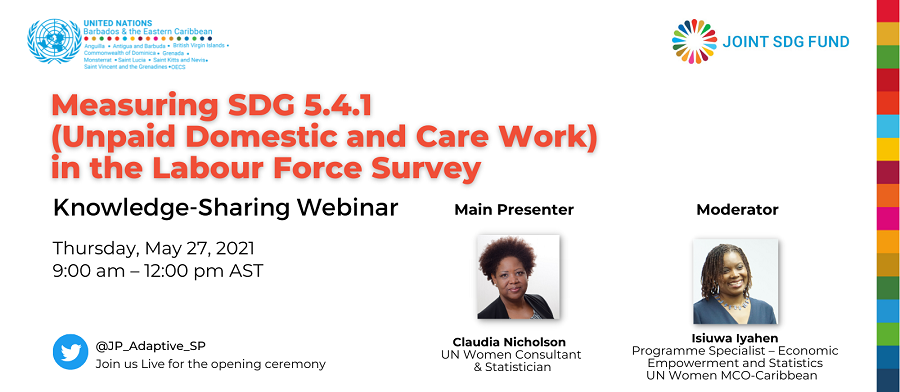
Bridgetown, Barbados, 27th May 2021:- As countries develop COVID-19 recovery strategies, investments in infrastructure must include the care economy, including measures to reduce and redistribute unpaid care work. Childcare, elder care and care of the sick is as crucial to a functioning economy as any road, electric grid or building. If workers, many of whom are women, drop out of the paid economy because of their unpaid care work responsibilities, the entire economy is negatively impacted.
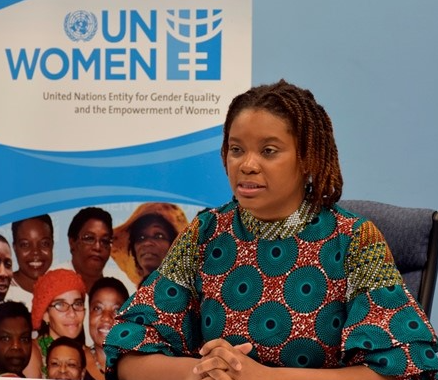
Moderator for the recent “Knowledge-Sharing Webinar - Measuring SDG 5.4.1 (Unpaid Domestic and Care Work) in the Labour Force Survey”, UN Women Programme Specialist-Economic Empowerment & Statistics, Isiuwa Iyahen highlighted that there is need for a shift in attitudes and culture to address the inequalities around unpaid care:
“What is happening is we really do need to address the 1st R, which is to Recognise unpaid care work as work and to the 2nd R to Reduce it and the 3rd R - to Redistribute it and that re-distribution has to take place within the home between families, including men and women in the households and the state, such day care services and elder care services. We have to ensure, and this is the 4th R, that those who do this care worker are Represented in the policy dialogues and the response and then, finally, the 5th R we need to Reward paid care work and we want to see this reflected in the GDP of countries, of course, we can't do this without data.”
UN Resident Coordinator for Barbados and the OECS, Mr. Dider Trebucq, in his opening remarks said:
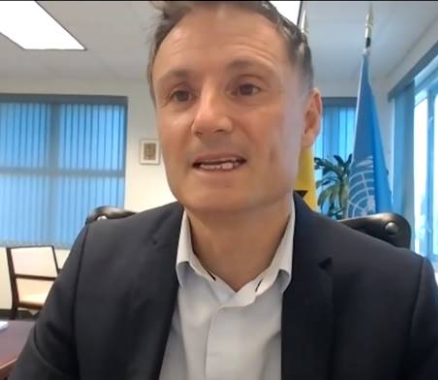 “The recently drafted UN Common Multi Country Analysis highlights the lack of data, as arguably the most critical impediment to measuring and managing progress towards Agenda 2030 in the Caribbean. If left unchecked this has the potential to affect development gains, segments of the society become invisible and this undermines the support given to the most vulnerable, often the women, elderly or disabled people… And so today, I could not be more delighted to address you as we prepare to bridge the gap between data and gender equality – specifically unpaid care work. We know that women are among the most vulnerable in our region. And so, I am always excited to support the work championed by UN Women as we, the UN family, seek to empower and enhance the standard of living of women and more specifically, to improve the financial independence of women; promote their equal participation in various facets of society. And this will ultimately improve the quality of life of all households.
“The recently drafted UN Common Multi Country Analysis highlights the lack of data, as arguably the most critical impediment to measuring and managing progress towards Agenda 2030 in the Caribbean. If left unchecked this has the potential to affect development gains, segments of the society become invisible and this undermines the support given to the most vulnerable, often the women, elderly or disabled people… And so today, I could not be more delighted to address you as we prepare to bridge the gap between data and gender equality – specifically unpaid care work. We know that women are among the most vulnerable in our region. And so, I am always excited to support the work championed by UN Women as we, the UN family, seek to empower and enhance the standard of living of women and more specifically, to improve the financial independence of women; promote their equal participation in various facets of society. And this will ultimately improve the quality of life of all households.Read the UN Resident Coordinator for Barbados and the OECS’ full remarks >>>
Representative – UN Women Multi-Country Office (MCO) – Caribbean, Ms. Tonni Brodber said:
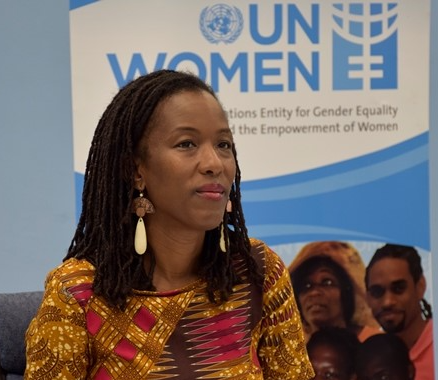
Read the UN Women Representative’s full remarks>>>
Ambassador Manorma Soeknandan, Deputy Secretary General, CARICOM Secretariat said: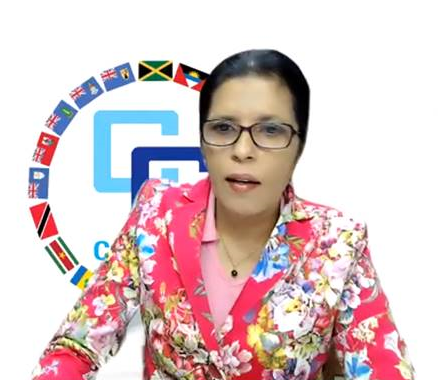 “The Gender Pillar of the CARICOM Regional Strategy for the Development of Statistics notes the need to fill the most pressing gender data gaps, including on unpaid care and domestic work or SDG 5.4.1. In the 44th Meeting of the Standing Committee of Caribbean Statisticians in 2019, it was agreed that 5 countries (Grenada, Guyana, Suriname, St. Vincent & the Grenadines and Trinidad & Tobago) would include a question in the upcoming round of censuses, in order to pilot the measurement of SDG 5.4.1. CARICOM is pleased to collaborate with UN Women, the OECS Commission, and other development partners in this effort. Other member states are encouraged to pilot these questions in their censuses and labour force surveys.”
“The Gender Pillar of the CARICOM Regional Strategy for the Development of Statistics notes the need to fill the most pressing gender data gaps, including on unpaid care and domestic work or SDG 5.4.1. In the 44th Meeting of the Standing Committee of Caribbean Statisticians in 2019, it was agreed that 5 countries (Grenada, Guyana, Suriname, St. Vincent & the Grenadines and Trinidad & Tobago) would include a question in the upcoming round of censuses, in order to pilot the measurement of SDG 5.4.1. CARICOM is pleased to collaborate with UN Women, the OECS Commission, and other development partners in this effort. Other member states are encouraged to pilot these questions in their censuses and labour force surveys.”
Read the CARICOM Deputy Secretary General’s full remarks>>>
Dr. Carlene Radix, Head, Human and Social Cluster, OECS Commission said: “The OECS 2017 to 2030 Regional Strategy for the Development of Statistics is aligned to the CARICOM RSDS and prioritises gender statistics an important contributor to this picture, and this story.
“The OECS 2017 to 2030 Regional Strategy for the Development of Statistics is aligned to the CARICOM RSDS and prioritises gender statistics an important contributor to this picture, and this story.
UN Women, as a participating UN agency in the UN Joint Programme on Adaptive Social Protection, is collaborating with the OECS Statistical Services Unit, to pilot a census-based approach to measuring SDG indicator 5.4.1 on unpaid domestic and care work. Through this intervention, training and technical support will be provided to relevant stakeholders in the OECS.”
Read the Head, Human and Social Cluster, OECS Commission’s full remarks >>>